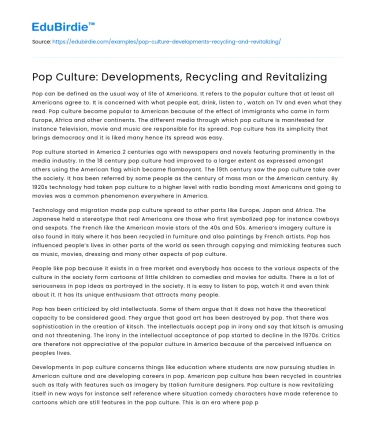Introduction
In the contemporary digital age, pop culture is both a reflection and a driver of societal norms and values. Defined by its ability to resonate widely across diverse audiences, pop culture is a dynamic entity that continually evolves, recycles, and revitalizes itself. This evolution is influenced by technological advancements, globalization, and the shifting tides of public sentiment. As such, the study of pop culture involves examining both its historical roots and its current manifestations. This essay delves into the developments in pop culture, the mechanisms of cultural recycling, and how such practices contribute to the revitalization of popular media and ideas. By understanding these processes, one gains insight into how pop culture not only entertains but also influences societal change. Furthermore, counter-arguments regarding the potential for cultural stagnation will be addressed to provide a comprehensive view of the subject.
Developments in Pop Culture
The development of pop culture is inherently linked to technological innovation. Over the past century, advancements in media technology have provided new platforms for cultural expression. The advent of radio and television in the early 20th century, for instance, revolutionized how stories were told and consumed. As Marshall McLuhan famously stated, "The medium is the message," highlighting how the form of media affects societal perception (McLuhan, 1964). Today, the rise of digital platforms such as YouTube, TikTok, and streaming services has further transformed pop culture by democratizing content creation and distribution. These platforms allow for niche interests to gain a global audience, exemplified by phenomena like the K-pop wave which has transcended its South Korean origins to captivate audiences worldwide.
Save your time!
We can take care of your essay
- Proper editing and formatting
- Free revision, title page, and bibliography
- Flexible prices and money-back guarantee
Moreover, the internet era has accelerated the pace of cultural exchange, leading to a more interconnected global pop culture. This has resulted in an environment where cultural products are no longer confined to their geographical origins. For example, the Marvel Cinematic Universe successfully blends various cultural elements to create stories that resonate across different demographics, thus becoming a global cultural touchstone. However, this rapid development is not without challenges. Critics argue that such globalization may lead to cultural homogenization, where local cultures are overshadowed by dominant media narratives. Nonetheless, the ongoing development of pop culture continues to shape and be shaped by the societies in which it exists.
Recycling in Pop Culture
Recycling in pop culture refers to the practice of reusing and reinterpreting existing cultural elements to create something new. This process is not merely a creative shortcut but rather a testament to the cyclical nature of cultural trends. The fashion industry, for instance, regularly revives past styles, with the resurgence of 90s fashion trends in the 2020s serving as a prime example. Similarly, the film industry frequently remakes classic movies or reboots beloved franchises, appealing to both nostalgia and a new generation of viewers.
Such recycling is often driven by a desire to connect with audiences on a deeper emotional level, as familiar elements evoke a sense of nostalgia. As scholar Fredric Jameson suggests, the "nostalgia mode" in postmodern culture is a response to the disorienting pace of societal change (Jameson, 1991). However, recycling in pop culture also faces criticism for potentially stifling creativity. Detractors argue that by relying on past successes, the industry risks becoming creatively stagnant. Yet, others contend that recycling allows for the reinterpretation of cultural artifacts, offering fresh perspectives and renewed relevance. For instance, Lin-Manuel Miranda's "Hamilton" reimagines American history through a contemporary lens, blending hip-hop with historical narrative to create a groundbreaking theatrical experience.
Revitalizing Pop Culture
The revitalization of pop culture involves breathing new life into existing cultural forms, often through innovative reinterpretation or by addressing contemporary issues. This process is crucial for maintaining cultural relevance and engagement. An exemplary case is the resurgence of vinyl records in an age dominated by digital music. This revival is driven by a desire for tangible, authentic experiences in an increasingly virtual world, proving that revitalization can stem from a cultural counter-movement against prevailing trends.
Moreover, revitalization often involves integrating modern sensibilities into traditional forms. The television series "The Crown," for instance, revitalizes historical drama by incorporating modern storytelling techniques and exploring themes of power and identity that resonate with today's audiences. Such reinvention keeps pop culture vibrant and reflective of contemporary societal values. However, the challenge lies in balancing respect for original forms with innovation. Some argue that excessive alteration risks alienating original audiences or diluting the cultural significance of the source material. Nevertheless, the ability to revitalize cultural elements ensures that pop culture remains a dynamic and influential force in society.
Conclusion
In conclusion, the ongoing evolution of pop culture is characterized by its developments, recycling, and revitalization, each contributing to its dynamic nature. Technological advancements have propelled the growth of pop culture, enabling it to transcend borders and resonate globally. Recycling practices, while sometimes criticized for lacking originality, offer opportunities for creative reinterpretation and nostalgia-driven engagement. Revitalization ensures that pop culture remains relevant by integrating contemporary themes and technologies. While concerns about cultural homogenization and stagnation persist, the resilience of pop culture demonstrates its capacity to adapt and reflect the ever-changing landscape of societal values. As such, pop culture remains a powerful medium for both entertainment and social commentary, continually shaping and being shaped by the society in which it thrives.






 Stuck on your essay?
Stuck on your essay?

